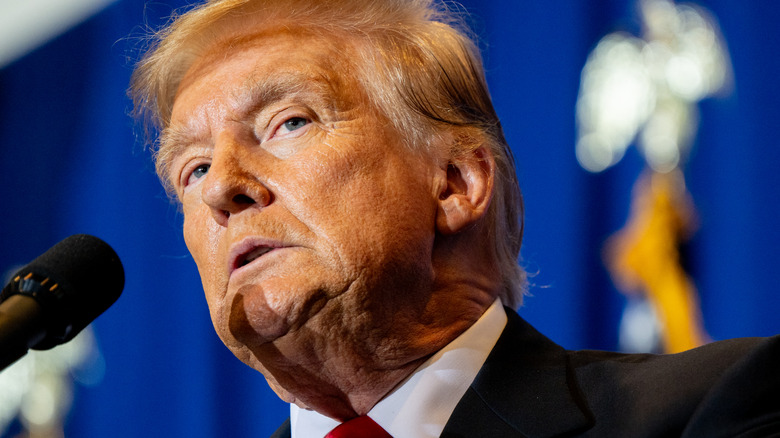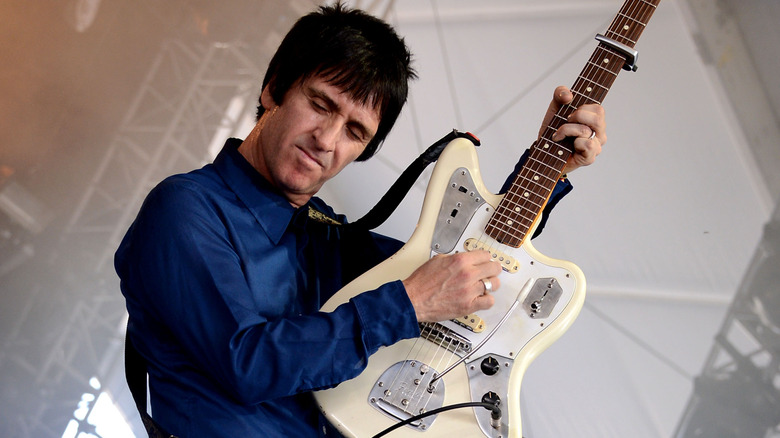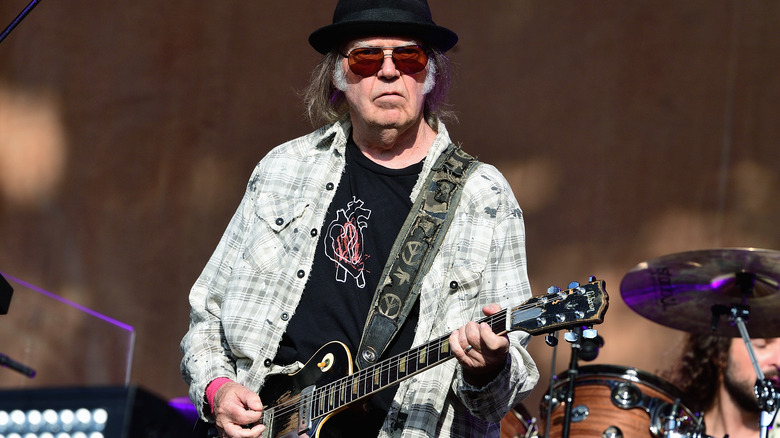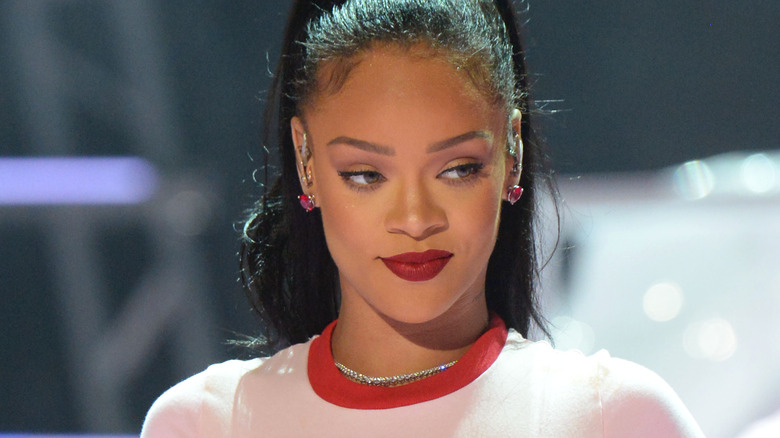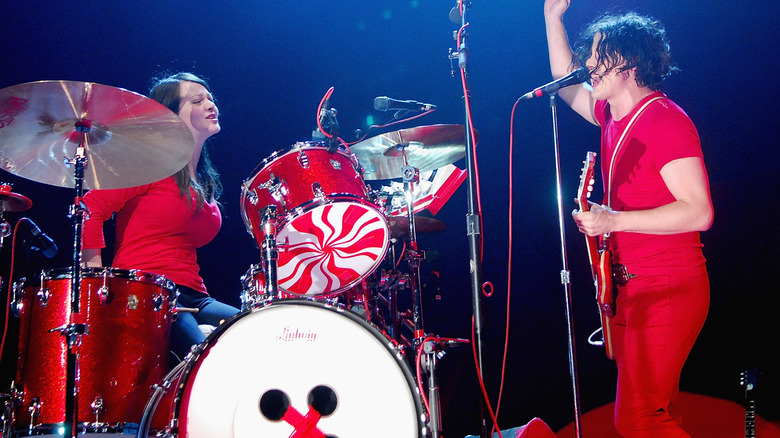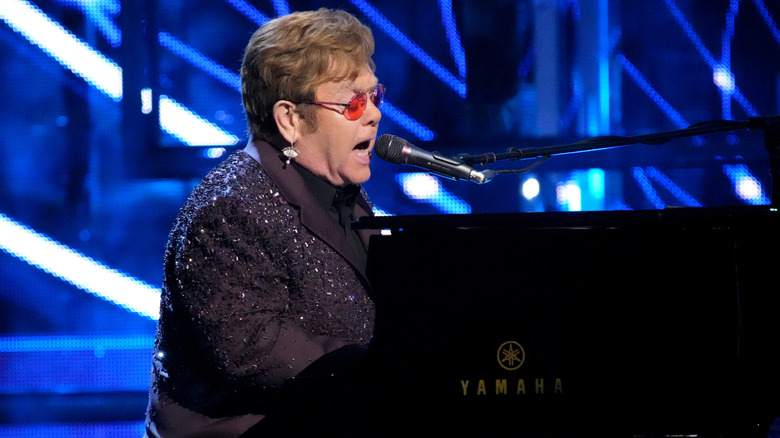Musicians Who Told Donald Trump To Stop Playing Their Music At His Events
Music is an integral part of large gatherings like sporting events, festivals, and even political rallies, offering crowds much-needed entertainment in between on-stage events and providing an energizing sense of community and fun. Most musicians might consider themselves to have "made it" if their music becomes culturally relevant enough to be played at these events. But in Donald Trump's case, his music choices have landed him in hot water multiple times over the years.
In many cases, these artists don't realize that their music is being used on campaign rally playlists until it's brought to their attention through their management team or, often, social media. Trump has attempted to use a wide variety of music for his rallies, conventions, and other events, including songs by the Beatles, Eddy Grant, Rihanna, and the Village People.
But when you're a significant political figure like Donald Trump, putting together an event soundtrack isn't as simple as grouping a few songs in a Spotify playlist. In his case, his team has been served multiple cease-and-desist letters from over 30 artists who were unhappy with their music being used at events related to the divisive former president.
The Smiths
ABC correspondent Soorin Kim posted a video of The Smiths' 1984 track "Please, Please, Please Let Me Get What I Want" playing through the loudspeakers at a Trump rally on X, formerly known as Twitter, on January 23, 2024. Only twelve hours later, the British alt-rock group's guitarist, Johnny Marr, shared the video on his X account with a caption that didn't mince words. "Ahh...right...OK. I never in a million years would've thought this could come to pass. Consider this s*** shut down right now."
Replies to Marrs' curt tweet were divided between those who supported Marrs' decision to ban The Smiths' music from Trump events and others who insisted that Marrs should have known that his music would potentially be licensed out after releasing it. Some users were quick to suggest that the song was appropriate, given The Smiths' lead singer, Morrissey's long history of controversial opinions regarding race and immigration.
However, even the divisive lead singer has been outspoken about his disdain for Trump. In 2017, Morrissey went so far as to say he would willingly kill the then-sitting president "for the safety of humanity," per Consequence.
Neil Young
Canadian-born folk rocker Neil Young's public battle with the Trump administration is an unfortunate glimpse into the downsides of musical licensing rights. In a now-deleted open letter to Donald Trump penned on his archives website, Young conceded that he had no legal recourse against the conservative politician using his 1989 track "Rockin' in the Free World" at his rallies and events. However, that didn't stop the musician from speaking his mind about it.
In an open letter to Trump published on Young's archive website, the "Heart of Gold" singer wrote, "You are a disgrace to my country. Every time 'Rockin' in the Free World' or one of my songs is played at your rallies, I hope you hear my voice. Remember it is the voice of a tax-paying U.S. citizen who does not support you. Me."
Undeterred by Young's fervent disapproval, the rocker's music was played at another Trump event months later. The event, held in front of the Mount Rushmore monument in South Dakota, featured Trump condemning protestors who deface monuments of past U.S. figures. Young responded to the event on X, restating his objections and emphasizing his support of the Lakota Sioux, an Indigenous nation of South Dakota, per USA Today.
Rihanna
Rihanna's countless energizing pop hits make her a common staple at sporting events and other large gatherings, but as of 2018, those events don't include rallies and conventions held by or in honor of Donald Trump. Rolling Stone reported in November of that year that the Barbados singer had joined a growing list of artists who sent cease-and-desist letters to Trump and his team after being tipped off about her inclusion at his events via social media.
Washington Post editor Philip Rucker tweeted about the then-sitting president's rallies on November 4, 2018, describing a Chattanooga rally in which Rihanna's "Don't Stop the Music" played on loudspeakers as Trump aides threw t-shirts to the rally attendees. Only one hour later, Rihanna retweeted Rucker's post with the caption, "Not for much longer...me nor my people would ever be at or around one of those tragic rallies, so thanks for the heads up philip!"
Rihanna's cease-and-desist letter emphasized that the pop singer had never approved of Trump's use of her music at his events. Moreover, the letter read, "Trump's unauthorized use of Ms. Fenty's music...creates a false impression that Ms. Fenty is affiliated with, connected to, or otherwise associated with Trump."
The White Stripes
Even those not well-versed in the alt-rock world have likely heard The White Stripes' iconic track, "Seven Nation Army." Its instantly recognizable bass line and driving drums have made it a modern-day counterpart to songs like Queen's "We Will Rock You." So, it's unsurprising that a then-campaigning Donald Trump would use such a riveting track during the final months of his first presidential race in 2016. But for the artists behind the song, it was quite a shock.
The White Stripes, composed of former couple Jack and Meg White, released a statement through their record label, Third Man Records, following Trump's use of their 2003 track in a campaign video. "The White Stripes would like to unequivocally state that they have nothing whatsoever to do with this video," the statement read, per The Detroit News. "They are disgusted by this association, and by the illegal use of their song."
As if to place an exclamation mark on their point, the White Stripes later released merch that further denounced the presidential hopeful. Riffing off the band's final album's title track, "Icky Thump," Third Man Records began selling t-shirts with the phrase "Icky Trump" on the front. The back of the shirt featured revised lyrics to the 2007 song that expressed disdain for conservative Trump supporters.
Elton John
Elton John first expressed his disdain for the use of his music at former President Donald Trump's rallies in 2016 after it was brought to his attention that Trump's team included "Tiny Dancer" and "Rocket Man" in their event playlists. But unlike other artists — including fellow British contemporaries like The Rolling Stones — who have used their cease-and-desist requests as a platform to denounce Trump, John insists it's a matter of nationality.
"I don't really want my music to be involved in anything to do with an American election campaign," John told The Guardian in 2016. "I'm British. I've met Donald Trump, he was very nice to me. It's nothing personal. His political views are his own, mine are very different. I'm not a Republican in a million years. Why not ask Ted f***ing Nugent? Or one of those f***ing country stars? They'll do it for you."
John, for his part, is right. "Catscratch Fever" rocker Ted Nugent is one of many musicians who have either explicitly expressed their support for Trump and the politician's use of their music or have done nothing to publicly stop it. Other artists who have directly or indirectly approved of Trump using their music include 3 Doors Down, Trace Adkins, Kid Rock, and Lee Greenwood.
